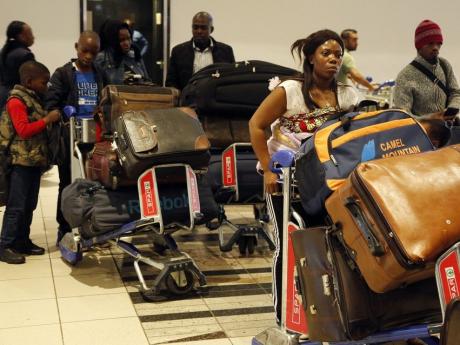
Nigerians queue at passport control at the O.R. Tambo International Airport in Johannesburg, South Africa, Wednesday, September 11, 2019. (AP Photo/Denis Farrell)
SOUTH Africa has been forced by the mass xenophobic attacks on foreigners by its citizens to examine its identity and its image in the world. It is located at the bottom of Africa, far from the western world, but is it African or European? What are its values? Given what has happened, it can’t be business as usual, tomorrow.
South Africa is a puzzle. After being the admiration of the world 25 years ago for peacefully achieving democracy, led by the giant of reconciliation Nelson Mandela, today it desperately apologises to Africa for its citizens’ violent behaviour towards other Africans: Nigerians, Ethiopians, Somalis, and others. The destroying of their businesses and their homes, and personal attacks which has driven many to flee back to their countries of origin. It’s a disgrace, and a profound feeling of guilt runs among many enlightened South Africans.
It’s not enough for them to hang their heads in shame. More is needed, but the politicians are so busy arguing among themselves and wary of being stabbed in the back by others that they do not speak out strongly enough. And those who do speak out are not listened to, because a mass mentality has taken root against foreigners.
Business leaders are a good barometer of how a country is doing. Confidence in the country and its leadership has sunk to historic lows as reflected through the eyes of people in business. The SA Chamber of Commerce and Industry’s BCI (Business Confidence Index) fell from 92 in July to 89.1 index points in August. This is its lowest level since April 1985, when the UN Security Council called for more sanctions against SA following the army’s raid in Botswana and the failure of the Eminent Persons Group talks, who were attempting to influence events in a positive direction.
But for many South Africans nothing has changed. Walk into a mall in the neighbourhood of Rosebank, Johannesburg, and you could be in Europe, seeing the world’s favourite brand names. Cars on the roads are the same as Europe, restaurants are urbane and sophisticated. Anything you can dream of, you can buy. The construction of fancy new buildings is taking place everywhere.
Nigerian novelist and journalist Adaobi Tricia Obinne Nwaubani whose book was named by the Washington Post as one of the Best Books of 2009, says South Africa is a ‘genetically modified’ African country, set in Africa but unlike the rest of African countries. Many Africans attribute its difference to the prevailing influence of the ‘Caucasians’ in their midst, she says.
South Africa remains an important country in Africa. It hosted the recent World Economic Forum in Cape Town where the African Continental Free Trade Agreement signed by 54 of Africa’s 55 countries, was discussed. Finance Minister Tito Mboweni says it’s the most important post-colonial development in Africa, the world’s largest trade group since formation of the World Trade Organisation. The agreement is expected to boost trade by African countries among themselves by 52% by 2022. Mboweni harshly condemns hostility towards foreigners and says they would vastly contribute to South’s Africa’s economy and society. Any African should be allowed to settle wherever they want in Africa. If Nigerians or Ethiopians want to live in South Africa it should be open to them.
But last week a privately owned Nigerian airline said it would repatriate around 600 Nigerian citizens fleeing xenophobic attacks in South Africa.
Parallel to the recent xenophobia which has dominated the headlines, is the upsurge of gender-based violence, which is rife in the country, highlighted in the wake of the rape and murder of 19-year-old University of Cape Town student Uyinene Mrwetyana, who was killed by a 42-year-old post office employee two weeks ago. The ANC Women’s League wants the country to consider chemical castration against men found guilty of rape. Yet all studies show that rape is not about sex, but power and control and even the death sentence does not reduce it.
The anger, fear and frustration has created a movement called #AmINext to give women a platform to share their feelings with others. But the answer must be found within the inner corners of society, in families, schools, churches, homes and social venues. One could assume that the #AmINext movement is about young black women like Mrwetyana, only. But one would be wrong. Even the Jewish community which puts looking after its own as a high priority is not immune, and gender-based violence often occurs behind the proverbial closed doors.
The harsh reality is that while South Africans broadly are a generous, warm-hearted people, their country has become a violent society for many who live here. People who come back for a visit after living elsewhere, are shocked to find the tension in the society where everyone is constantly looking over their shoulders and people in the suburbs live behind high walls.
South Africa has been a country on the edge for as long as most people can remember, through colonialism, apartheid and now the current situation, a long continuum with a few years’ break during which Mandela lifted the spirits. Yet through each crisis, it has survived, prospered and grown, and its sophisticated economy is one of the largest in Africa, which is why Nigerians and other Africans come here in droves to be associated with it.
Pessimists say it can’t go on like this and must eventually stop working and go down the tubes. Optimists, however, see huge opportunities here for brave people with the initiative to reinvent this gem.
GEOFF SIFRIN is a journalist in Johannesburg, South Africa, and former Editor of the SA Jewish Report. Email: geoffs@icon.co.za